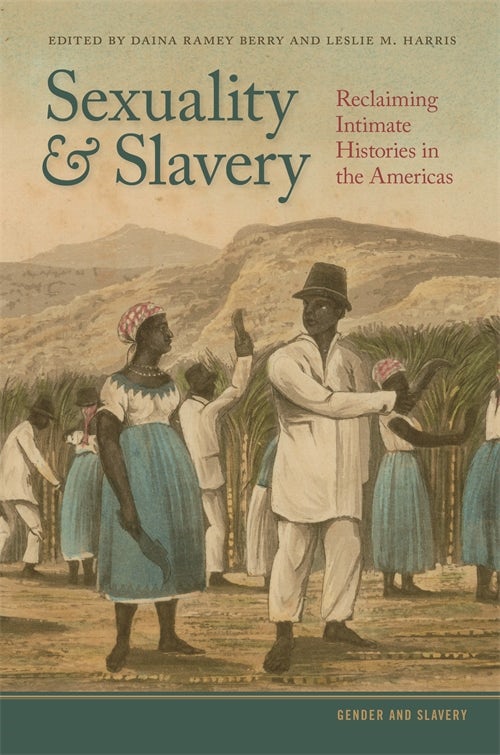Sexuality and Slavery: Reclaiming Intimate Histories in the AmericasPosted in Anthologies, Books, Caribbean/Latin America, History, Media Archive, Slavery, United States, Women on 2021-09-20 13:57Z by Steven |
Sexuality and Slavery: Reclaiming Intimate Histories in the Americas
University of Georgia Press
2018-10-01
240 pages
5 b&w images
6.000in x 9.000in
Hardcover ISBN: 9-780-8203-5403-3
Paperback ISBN: 9-780-8203-5404-0
Edited by:
Daina Ramey Berry, Oliver H. Radkey Regents Professor of History
University of Texas, Austin
Leslie M. Harris, Professor of History
Northwestern University, Evanston, Illinois
Foreword by:
Catherine Clinton, Denman Endowed Professor in American History
University of Texas, San Antonio
An examination of the many facets of sexuality within slave communities
In this groundbreaking collection, editors Daina Ramey Berry and Leslie M. Harris place sexuality at the center of slavery studies in the Americas (the United States, the Caribbean, and South America). While scholars have marginalized or simply overlooked the importance of sexual practices in most mainstream studies of slavery, Berry and Harris argue here that sexual intimacy constituted a core terrain of struggle between slaveholders and the enslaved. These essays explore consensual sexual intimacy and expression within slave communities, as well as sexual relationships across lines of race, status, and power. Contributors explore sexuality as a tool of control, exploitation, and repression and as an expression of autonomy, resistance, and defiance.
Table of Contents
- Foreword / Catherine Clinton
- Acknowledgments
- Introduction / Daina Ramey Berry and Leslie M. Harris
- Chapter 1 : Early European Views of African Bodies: Beauty / Stephanie M. H. Camp
- Chapter 2: Toiling in the Fields: Valuing Female Slaves in Jamaica, 1674-1788 / Trevor Barnard
- Chapter 3: Reading the Specter of Racialized Gender in Eighteenth-Century Bridgetown, Barbados / Marisa J. Fuentes
- Chapter 4: As if She Were My Own: Love and Law in the Slave Society of Eighteenth-Century Peru /Bianca Premo
- Chapter 5: Wombs of Liberation: Petitions, Law, and the Black Woman’s Body in Maryland, 1780-1858 / Jessica Millward
- Chapter 6: Rethinking Sexual Violence and the Marketplace of Slavery: White Women, the Slave Market, and Enslaved Peoples Sexualized Bodies in the Nineteenth-Century South / Stephanie Jones-Rogers
- Chapter 7: The Sexual Abuse of Black Men under American Slavery Thomas A. Foster
- Chapter 8: Manhood, Sex, and Power in Antebellum Slave Communities / David Doddington
- Chapter 9: What’s Love Got to Do with It? Concubinage and Enslaved Women and Girls in the Antebellum South / Brenda E. Stevenson
- Chapter 10: When the Present Is Past: Writing the History of Sexuality and Slavery / Jim Downs
- Contributors
- Index

